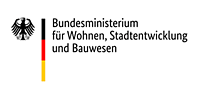Aktuelles
26.05.2014
Ecological aspects of building materials within the Assessment System for Sustainable Building (BNB)
There are numerous political initiatives – at global, European and national levels – that formulate political objectives in connection with sustainability, such as energy efficiency, resource efficiency and reduction of greenhouse gases. Various political programmes deal with different individual aspects of sustainability. Frequently, the topics relevant to construction are linked to requirements with respect to building materials and building products.
In applying the BNB, many of the sustainability aspects mentioned in the various political initiatives are taken into account by means of comprehensive sustainability criteria, such as the deconstruction of buildings, recyclability of building products, global environmental effects with the global warming potential at their core, environmental and health-relevant effects on soil, water and air, indoor air quality and other aspects.
The role played by building materials/products in the BNB has to be considered. Against the background of sustainable development, there are frequent calls for naming so-called ecological or sustainable building products. As the sustainability of a building under the BNB principles is ensured by taking all sustainability criteria in relation to ecological, economic, socio-cultural, technical and process quality into account, building products are not assessed as individual products, but looked at within the context of the entire building. Building products have to meet a wide range of requirements in terms of technical aspects (e.g., stability, fire protection, durability) as well as environmental and health-relevant aspects (e.g., risks to the environment, risks to users during processing or while a building is used) and economic aspects (costs). The assessment of whether building products in a building are used in a sustainable manner, therefore, depends on the context of the building in question and, thus, on different sustainability criteria. Essentially, the properties of building products play a role in all areas of sustainability: ecological quality (life cycle analysis, environment, material), economic quality (life cycle costs), socio-cultural quality (e.g., indoor air quality), technical quality and process quality. Consequently, building materials are indirectly and proportionately assessed for the purposes of the BNB by way of different criteria profiles – generally taking the life cycle over the chosen time period of 50 years into account.
Particularly with respect to ecological quality, that is when considering the impact on the global and local environment, building materials form an essential part of the overall assessment. The effects on the global and local environment (global warming, ozone depletion, photochemical ozone creation, acidification and eutrophication potential), which are determined by a life cycle analysis, play a vital role. In addition, the risk potential for the environmental resources ground water, surface water, soil, outside air and indoor air is analysed.
As part of the Sustainable Building programme, the Federal Government provides important aids for choosing suitable building products. ÖKOBAU.DAT supplies basic data for life cycle analyses in the building context. In addition, the WECOBIS internet platform provides key information on the environmental and health-relevant aspects of building products.
